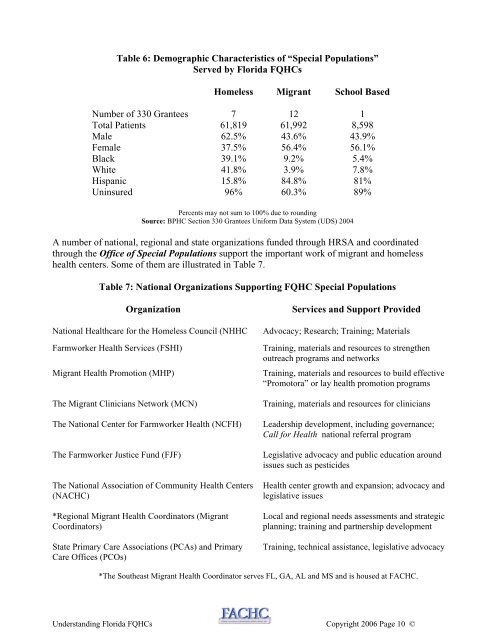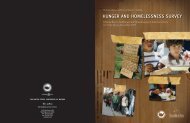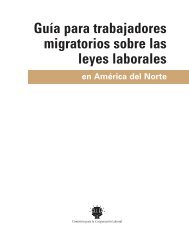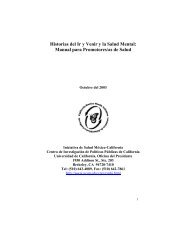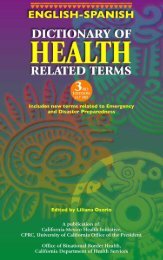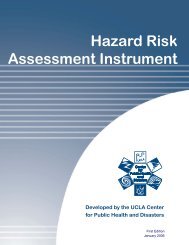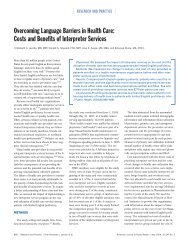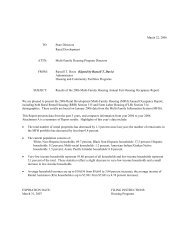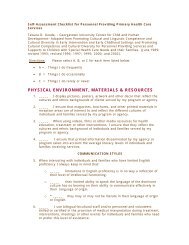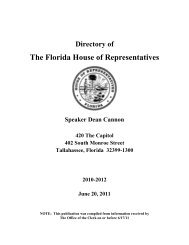Guide to Understanding Florida's FQHCs and 330 Expansion ...
Guide to Understanding Florida's FQHCs and 330 Expansion ...
Guide to Understanding Florida's FQHCs and 330 Expansion ...
Create successful ePaper yourself
Turn your PDF publications into a flip-book with our unique Google optimized e-Paper software.
Table 6: Demographic Characteristics of “Special Populations”<br />
Served by Florida <strong>FQHCs</strong><br />
Homeless Migrant School Based<br />
Number of <strong>330</strong> Grantees 7 12 1<br />
Total Patients 61,819 61,992 8,598<br />
Male 62.5% 43.6% 43.9%<br />
Female 37.5% 56.4% 56.1%<br />
Black 39.1% 9.2% 5.4%<br />
White 41.8% 3.9% 7.8%<br />
Hispanic 15.8% 84.8% 81%<br />
Uninsured 96% 60.3% 89%<br />
Percents may not sum <strong>to</strong> 100% due <strong>to</strong> rounding<br />
Source: BPHC Section <strong>330</strong> Grantees Uniform Data System (UDS) 2004<br />
A number of national, regional <strong>and</strong> state organizations funded through HRSA <strong>and</strong> coordinated<br />
through the Office of Special Populations support the important work of migrant <strong>and</strong> homeless<br />
health centers. Some of them are illustrated in Table 7.<br />
Table 7: National Organizations Supporting FQHC Special Populations<br />
Organization<br />
National Healthcare for the Homeless Council (NHHC<br />
Farmworker Health Services (FSHI)<br />
Migrant Health Promotion (MHP)<br />
The Migrant Clinicians Network (MCN)<br />
The National Center for Farmworker Health (NCFH)<br />
The Farmworker Justice Fund (FJF)<br />
The National Association of Community Health Centers<br />
(NACHC)<br />
*Regional Migrant Health Coordina<strong>to</strong>rs (Migrant<br />
Coordina<strong>to</strong>rs)<br />
State Primary Care Associations (PCAs) <strong>and</strong> Primary<br />
Care Offices (PCOs)<br />
Services <strong>and</strong> Support Provided<br />
Advocacy; Research; Training; Materials<br />
Training, materials <strong>and</strong> resources <strong>to</strong> strengthen<br />
outreach programs <strong>and</strong> networks<br />
Training, materials <strong>and</strong> resources <strong>to</strong> build effective<br />
“Promo<strong>to</strong>ra” or lay health promotion programs<br />
Training, materials <strong>and</strong> resources for clinicians<br />
Leadership development, including governance;<br />
Call for Health national referral program<br />
Legislative advocacy <strong>and</strong> public education around<br />
issues such as pesticides<br />
Health center growth <strong>and</strong> expansion; advocacy <strong>and</strong><br />
legislative issues<br />
Local <strong>and</strong> regional needs assessments <strong>and</strong> strategic<br />
planning; training <strong>and</strong> partnership development<br />
Training, technical assistance, legislative advocacy<br />
*The Southeast Migrant Health Coordina<strong>to</strong>r serves FL, GA, AL <strong>and</strong> MS <strong>and</strong> is housed at FACHC.<br />
<strong>Underst<strong>and</strong>ing</strong> Florida <strong>FQHCs</strong> Copyright 2006 Page 10 ©


